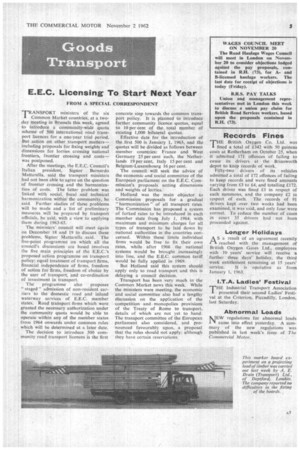E.E.C. Licensing To Start Next Year
Page 7

If you've noticed an error in this article please click here to report it so we can fix it.
FROM A SPECIAL CORRESPONDENT
TRANSPORT ministers of the six I Common Market countries, at a twoday meeting in Brussels this week, agreed to introduce a community-wide quota scheme of 500 international road transport licences for a one-year trial period. But action on other transport matters— including proposals for fixing weights and dimensions for lorries crossing national frontiers, frontier crossing and costs— was postponed.
After the meetings, the E.E.C. Council's Italian president, Signor Bernardo Mattarella, said the transport ministers had not been able to agree on the question of frontier crossing and the harmonization of costs. The latter problem was linked with social, fiscal and technical harmonization within the community, he said. Further studies of these problems will be made and a list of preliminary measures will be prepared by transport officials, he said, with a view to applying them during 1963-65.
The ministers' council will meet again on December 18 and 19 to discuss these• problems, Signor Mattarella ,said. The five-point programme on which all the council's discussions are based involves the five main principles of the E.E.C.'s proposed action programme on transport policy: equal treatment of transport firms, financial independence of firms, freedom of action for firms, freedom of choice by the user of transport, and co-ordination of investment in transport.
The programme also proposes " staged " admission of non-resident carriers to the domestic road and inland waterway services of E.E.C. member states, Road trahsport firms which were granted the necessary authorization under the community quota would be able to operate within any of the member states from 1964 onwards under common rules which will be determined at a later date.
The decision to introduce 500 community road transport licences is the first
concrete.step towards the common transpart policy. It is planned to introduce further community licence quotas, equal to 10 peroent of the, total number of existing 1,000 bilateral quotas.
Effective date for the introduction of the first 500 is January 1, 1963, and the quotas will be divided as follows between member countries: France and West Germany 25 per cent each, the Netherlands 19 per cent, Italy 15 per cent and Belgium-Luxembourg 16 per cent.
The council will seek the advice of the economic and social committee of the European parliament on the E.E.C. Commission's proposals setting dimensions and weights of lorries.
Holland was the main objector to Commission proposals for a gradual " harmonization" of all transport rates. The Commission has proposed a system of forked rates to be introduced in each member state from July 1, 1964, with maximum and minimum charges for all types of transport to be laid down by national authorities in the countries concerned. Within these limits individual firms would be free to fix their own rates, while after 1966 the national systems would be brought increasingly into line, and the E.E.C. common tariff would be fully applied in 1969.
But Holland said this system should apply only to road transport and this is delaying a council decision. Transport has been very much in the Common Market news this week. While the ministers were meeting, the economic and social committee also had a lengthy discussion on the application of the competition • and monopolies provisions of the Treaty of Rome to transport, details of which are not yet to hand. The transport committee of the European parliament also considered, and pronounced favourably, upon, a proposal that the rules should not apply; although they have certain reservations.
































































































































































